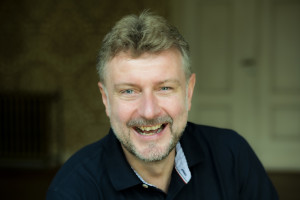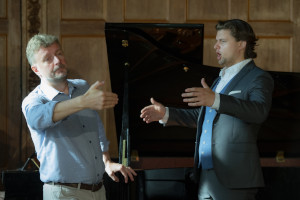



Teaching
Ladies and gentlemen, welcome to the teaching section of my website!
Why did I become a teacher in the first place?
Why does my own artistic career no longer play such a decisive role?
Singing has been very important to me since I was a child. I understood early on that singing can have great effects and trigger strong emotions, although my first experiences had nothing to do with professional opera singing. Like many of my ancestors, I became a miner. A singing miner, fortunately!
Studying at the Krakow Conservatory was the beginning of a dream journey. This was followed by my time at the Dresden Conservatory, which soon became a second home to me. Then my career began, and the world seemed open to me. I was able to perform in New York, Madrid, Berlin, Vienna, Paris, London, Moscow, Barcelona, Melbourne and many other wonderful cities, and I enjoyed the beauty of this world. However, over time, I realised that I had achieved the goals I set for myself. I was more and more enthusiastic about teaching, which had been part of my artistic life since my studies in Dresden.
I was able to listen to the lovely singing of my students, and I enjoyed their energy. Some of the students were already singing so well that my own singing seemed more and more superfluous to me. I realised that the teaching vocation brings a lot of fulfilment and that the success of my students makes me just as happy as my own performances do.
I received the opportunity to prove myself as a professor. I try to seize this opportunity with abundant energy and great commitment. The Hanover University of Music, Drama and Media offers me the best environment for fulfilling this task. The cooperation with my highly professional colleagues, with whom there is a lively exchange of knowledge and team-teaching, works well, and is always characterised by appreciation and great collegiality.
I am able to develop my students at this conservatory, and I am delighted to see how successful many of them are. I am very grateful and happy about that!
Through discussion with colleagues who work at other European conservatories, I have noticed in recent years that it has become increasingly difficult not only in Hanover but everywhere to find talented candidates for the course.
Why is that?
With the Europe-wide homogeneity and shortened school systems, the pupils in secondary schools are often overwhelmed with the amount of learning material they have, and no longer have the energy to practice properly in the evening or to travel to the next larger city to take music lessons. In my opinion, this is also due to the media, which sends the youth a utopian message that everything has to be fun and that a fast career is possible without any effort. These values are presented to young people in various ways, including in low-level programs like “The Voice” and “Deutschland sucht den Superstar”. Fewer and fewer young people have the necessary drive and energy.
However, these students do exist!
So how do you find talented people who have the necessary requirements to study singing?
The teacher's reputation is crucial! The social media generation exchanges information with each other faster than we sometimes would like. Unless of course, the information is good and concerns us...
It takes a lot of energy, good performance and a strong presence to get the attention you need. This is why I offer singing courses every year to discover as many new talents as possible.
I see this job as a good opportunity to attract young talent for Hanover, and it is in fact part of my teaching strategy.
I started teaching in Krakow in 2009 with four Polish male voices and I noticed their talent, hard work and determination from the start. A baritone was hired at the Opéra National de Paris and a bass at the State Opera in Munich, whilst the other two got engagements at Polish theatres.
That was a good start and there was a lot of talk about my teaching. Fortunately, my students are still successful, which is why more and more candidates are introducing themselves to me.
I already know which students would like to come to me for the next academic year. I prepare the best in my opinion for the entrance exam.
I cannot, however, guarantee a place at the conservatory. There are singers of different nationalities, but I only measure them according to their performance (which of course, ultimately decides on success) and never according to their origin. Only the best and most extraordinary of them can become successful in today's music world. The agents and opera house directors have high demands, because they too depend on the market and the expectations of the audience.
In contrast to the instrumentalists, we singers can approach a musical future much later. Many, however, take too much time and try to start their studies without any preparation, as was the case with me after mining college. My theoretical knowledge at that time would not be sufficient today for a successful entrance examination.
The enormous time pressure that we teachers are exposed to and the expectations of today's market have a major effect on the training. In addition, as a result of the so-called Bologna Process in 2008, the German Bundestag recommended to art schools: "More than before, to integrate the economic processes of the art and culture industry into training and not simply leave this to other institutions of further education or private company offers ".
The professor is therefore increasingly being called upon to act as a manager and career planner. However, this also means that candidates have to bring a good knowledge base to their studies before the entrance examination and cannot only rely on their talent. Talent is, however, without a doubt the most important requirement!
Again and again, I have to assess how talented a candidate is and whether it is enough for a singing degree and a successful career. It seems important for me to get to know the person who would like to study with me as closely as possible. I take a lot of time for this, because the first impression can be true, but it’s not always the case. In order to made a decision about a candidate, I try to determine different aspects:
1st Aspect - The Voice
Here I try to:
- find the extraordinary facets of the singer's timbre
- check the range of the voice
- test the sound in different registers - especially in the passaggio – as well as the ability to use the ‘clutch’ to change registers smoothly
- explore the flexibility of the voice (loud-quiet, soft-hard, fast-slow)
2nd Aspect - The Musicality
This term stands not only for the ability to create a musical phrase and to give it expression, but also to find the right character in the music of different eras with a sense of stylistic awareness. I try to test the breadth of expressiveness in different styles and the ability to adapt to the structure of the compositions and finally to present them with conviction. The prerequisite for this is a high level of sensitivity, emotionality, and great stylistic susceptibility. Students should acquire a well-founded aesthetic character by deepening their knowledge in various specialist areas during their studies.
3rd Aspect - The Language
Candidates for a bachelor's degree should already present their works in different languages. Here I attach great importance to the correct pronunciation of the texts and the ability to recognise and correct errors. Some candidates find this very difficult. Operas are, however, based on libretti, songs are based on poetry and prose. These should not only be pronounced well in different languages, but the content must also be understood and correctly interpreted. Only then can one serve the structure of the composition and reach the audience with and vocal sound the affect of the word. I find students' ability to speak several languages essential.
4th Aspect - Person and Personality
All people are different from one another, not only externally, but also mentally. In contrast to the instrumentalists, the instrument - the singer's voice - is inside him or her. The body is its resonance chamber. Sometimes you can already recognise the voice type by the appearance of the person.
The voice alone is not enough for a successful career. The candidate must have a strong personality and musical soul. These determine his/her singing identity. The personality expresses itself in the individual forming of sound. These in turn make a singer distinctive. Candidates must also be very hardworking and have the ability to learn quickly. Bringing the person and their personality into harmony and developing them further during their studies is one of the most difficult, but also one of the most important educational tasks for me. If I decide on a candidate and he or she passes the entrance exam, I use my teaching concept, which I would like to briefly introduce to you, individually. I use my concept in the various courses with different focuses. Since I assume that the student will develop over a long period of time, I also try to adapt the speed to each individual.

